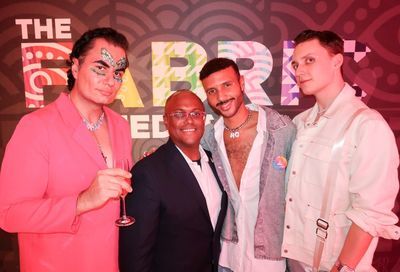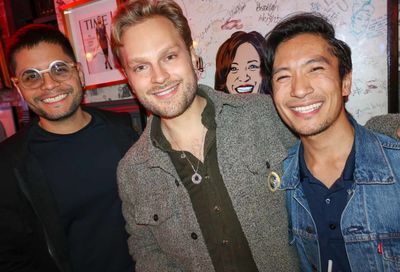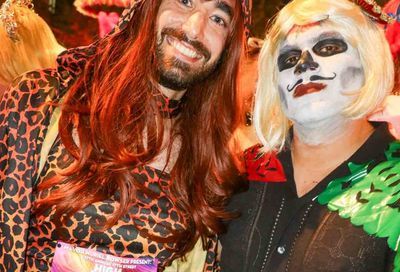Queer Commitment: Netflix’s LGBT-inclusive Content
Netflix is dedicated to LGBT content -- and that includes its original series

If ever there’s one area where Netflix can comfortably beat its more traditional TV-based competitors, it’s in the representation it gives to LGBT characters. As if it weren’t enough that the streaming giant’s catalogue is crammed with an array of LGBT films and television shows, both recent and classic, Netflix’s original content is also rife with characters that represent various aspects of the queer spectrum. From the outrageous, flamboyant Titus Andromedon in Unbreakable Kimmy Schmidt, to the intense relationship between Piper and Alex in Orange Is the New Black, to the entire main cast of Sense8, Netflix and its creators have committed to an array of depictions of LGBT people, both comical and serious. We highlight nine series by Netflix that showcase LGBT characters.

Grace and Frankie — The series centers around Grace (Jane Fonda) and Frankie (Lily Tomlin), whose husbands abruptly announce that they are in love with one another, have been having an affair for 20 years, and are leaving the two women to start a life together. At the series’ core is the odd-couple relationship between Grace and Frankie, who ultimately end up sharing the same home as they come to terms with single life. While the focus is firmly on the two women, there are numerous moments that will resonate with LGBT viewers, as Sol (Sam Waterston) and Robert (Martin Sheen) come out to their friends, families and former co-workers. A second season premieres May 6.
Hemlock Grove — Netflix’s Emmy-nominated horror fantasy managed to survive for three seasons before it was quietly put out to pasture, but we’re not sure of anyone who actually watched the 33 episodes produced (except, it seems, Emmy voters). That said, the show didn’t shy away from R-rated content, including flaying a lesbian werewolf-hunter from the waist up in season one. She was then quietly suffocated by Dr. Johann, who was repeatedly hinted to be gay. He was also totally devoid of emotion and one of the Grove’s darkest characters, so not exactly boyfriend material. All three seasons remain available to stream.
House of Cards — The political thriller that D.C. residents can’t get enough of, House of Cards isn’t short of gay characters. However, it’s protagonist Frank Underwood (Kevin Spacey) who invites the most speculation and discussion. Frank’s sexuality is never discussed in House of Cards, but he’s known to have had sexual encounters with both men and women. From a gay fling in college to flirtations with an author to a threesome with his wife and another man, Frank’s sexuality is a constant source of questions. Indeed, the show’s third season is the only time he is explicitly shown having sex with wife Claire (Robin Underwood) — and only her. Showrunner Beau Willimon, however, is quick to refute questions about sexuality. “People have asked me straight up, is Frank Underwood bisexual? Is he gay?” he told Huffington Post last year. “I think he’s incredibly guarded with who he lets get close to him, whether that’s platonic or whether that’s sexual. And when he does, it’s not necessarily a gender or preference, it really has to do with trust.” The show’s fourth season premiered earlier this year, with a fifth to air in 2017.
Jessica Jones — One of Netflix and Marvel’s collaborations, Jessica Jones follows the eponymous comic book character, a former superhero who opens a detective agency. Critics have applauded the show’s approach to a variety of themes, not least sexuality. For her transition to the screen, one of Jones’ (Krysten Ritter) allies was transformed — Jeri Hogarth (Carrie-Anne Moss) is an attorney who hires Jones for cases, but always depicted as male in the comics. Here, she is female and a lesbian, with Jessica Jones‘ first season following the breakdown of her marriage due to an affair. Moss described her character to ComicBook.com, saying she “goes after what she wants; she is kind of playing that male role, the mid-life kind of finding herself a little bit, making some decisions that are impacting her life based on greed, and status, and sex.” Jessica Jones has been renewed for a second season.
Master of None — Aziz Ansari’s comedy-drama was lauded by critics when it debuted late last year, but it’s not just the show itself that is noteworthy. The character of Denise was originally written as a white, straight woman who could become a potential love interest for Dev (Ansari). Instead, she became an African-American lesbian friend, all thanks to Lena Waithe. “I don’t think they ever intended her to be African-American. They definitely didn’t intend for her to be gay,” she told Entertainment Weekly in November. “But when Aziz met me, he was like, ‘I like what I’m seeing and I want to make the character a little more like you.’ They were really cool and went back and rewrote the character to reflect more of my personality, which was amazing.” A second season of Master of None is expected to premiere in 2017.

Orange Is the New Black — Few shows have achieved the kind of cultural juggernaut status of Orange Is the New Black in recent years. Whenever a new season airs, it’s tough to escape the conversations, GIFs and articles depicting and dissecting the goings on at Litchfield Penitentiary. It certainly hasn’t hurt that the show has made lesbian, bisexual and transgender characters centrepieces of its narrative, giving each open, frank and engrossing stories. OITNB‘s central hook is that of the relationship between Piper (Taylor Schilling) and Alex (Laura Prepon), with the latter being the cause for the former to spend 15 months in prison after being convicted of drug smuggling. The show also hasn’t shied from its frank depictions of lesbian sex and relationships in prison — including the fluid sexualities of those who are merely engaging in relationships until their release date. OITNB also gave the world Laverne Cox, whose portrayal of trans inmate Sophia led to her becoming the first transgender actor to be nominated for an Emmy Award. A fourth season premieres on June 17, with three more seasons confirmed after that.

Sense8 — Sense8 hasn’t shied from dealing with sexuality and gender, but few shows have been quite as extensive and sweeping in their commitment to covering such issues as Netflix’s sci-fi series. It follows eight individuals who suddenly become mentally and emotionally linked, gaining access to one another’s senses, language skills and knowledge. The main cast includes Nomi (Jamie Clayton), a trans woman who lives in San Francisco with her girlfriend, and Lito (Miguel Ángel Silvestre), a closeted actor in Mexico city who lives with his boyfriend. The show has dealt with AIDS, gender identity, sexuality and a number of other topics, but it was a reveal outside of the show that shed new light on its devotion to diversity: when a fan asked actor Brian Smith on Twitter whether his character Will was bisexual, he replied that “Lana [Wachowski] thinks all the characters are pansexual.” Here’s hoping that’s further explored in Sense8‘s confirmed second season.
Unbreakable Kimmy Schmidt — Unbreakable Kimmy Schmidt may have been a star vehicle for Ellie Kemper, who plays the title character, but it’s in Tituss Burgess’ Titus Andromedon that the show truly thrives. Kimmy’s roommate, an aspiring Broadway performer, offers many of the series’ laughs during its first season, whether in his one-man performance of Lion King, a role as a Werewolf at a horror-themed restaurant, or recording his smash hit “Peeno Noir,” a song he tells his landlady is “an ode to black penis.” Titus gives us life as Kimmy’s source of inspiration and criticism over the first season, with a string of endlessly quotable quotes. “I envy you. I’ve never been able to meet me.” Never change, Titus. Season 2 of Unbreakable Kimmy Schmidt premieres April 15.
Wet Hot American Summer: First Day of Camp — When the original film debuted in 2001, it showcased the romance between Ben (Bradley Cooper) and McKinley (Michael Ian Black), including a sexy scene in the summer camp’s supply shed. For Netflix’s prequel series, it was all about the build-up: the slow reveal of how the two characters started their budding relationship. We highly recommend watching the series from start to finish, then going back and enjoying that shed scene again with a little extra emotional padding. Both the film and series are available to stream now — though no word on if we’ll ever see more from Camp Firewood.
Support Metro Weekly’s Journalism
These are challenging times for news organizations. And yet it’s crucial we stay active and provide vital resources and information to both our local readers and the world. So won’t you please take a moment and consider supporting Metro Weekly with a membership? For as little as $5 a month, you can help ensure Metro Weekly magazine and MetroWeekly.com remain free, viable resources as we provide the best, most diverse, culturally-resonant LGBTQ coverage in both the D.C. region and around the world. Memberships come with exclusive perks and discounts, your own personal digital delivery of each week’s magazine (and an archive), access to our Member's Lounge when it launches this fall, and exclusive members-only items like Metro Weekly Membership Mugs and Tote Bags! Check out all our membership levels here and please join us today!






















You must be logged in to post a comment.